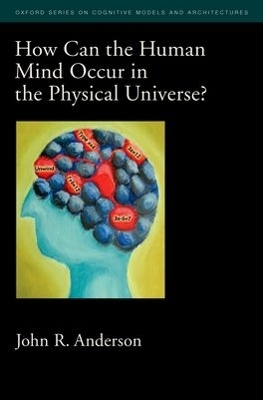
How Can the Human Mind Occur in the Physical Universe?
Oxford University Press Inc (Verlag)
978-0-19-532425-9 (ISBN)
"The question for me is how can the human mind occur in the physical universe? We now know that the world is governed by physics. We now understand the way biology nestles comfortably within that. The issue is how will the mind do that as well?" Alan Newell, 4 December 1991, Carnegie Mellon University
The argument John Anderson gives in this book was inspired by the passage above, from the last lecture by one of the pioneers of cognitive science. Alan Newell describes what, for him, is the pivotal question of scientific inquiry, and Anderson gives an answer that is emerging from the study of brain and behaviour.
Humans share the same basic cognitive architecture with all primates, but they have evolved abilities to exercise abstract control over cognition and process more complex relational patterns. The human cognitive architecture consists of a set of largely independent modules associated with different brain regions. This book discusses in detail how these various modules can combine to produce behaviors as varied as driving a car and solving an algebraic equation, but focuses principally on two of the modules: the declarative and procedural. The declarative module involves a memory system that, moment by moment, attempts to give each person the most appropriate possible window into his or her past. The procedural module involves a central system that strives to develop a set of productions that will enable the most adaptive response from any state of the modules. Newell argued that the answer to his question must take the form of a cognitive architecture, and Anderson organizes his answer around the ACT-R architecture, but broadens it by bringing in research from all areas of cognitive science, including how recent work in brain imaging maps onto the cognitive architecture.
John R. Anderson is the R. K. Mellon University Professor of Psychology and Computer Science at Carnegie Mellon University. He has led the development of the ACT-R cognitive architecture and its applications, especially intelligent tutoring systems. Anderson has been recognized as a leader in the field of cognitive science by a number of awards, including the American Psychological Association's Distinguished Scientific Career Award, the David E. Rumelhart Prize for Contributions to the Formal Analysis of Human Cognition, the Howard Crosby Warren Medal for outstanding achievement in Experimental Psychology, and the Dr. A.H. Heineken Prize for Cognitive Science. He has been elected to the National Academy of Sciences and the American Academy of Arts and Sciences and is a past president of the Cognitive Science Society.
1. Cognitive Architecture ; 2. The Modular Organization of the Mind ; 3. Human Associative Memory ; 4. The Adaptive Control of Thought ; 5. What Does It Take to Be Human? Lessons From High School Algebra ; 6. How Can the Human Mind Occur?
| Erscheint lt. Verlag | 6.9.2007 |
|---|---|
| Reihe/Serie | Oxford Series on Cognitive Models and Architectures |
| Zusatzinfo | 100 line illustrations |
| Verlagsort | New York |
| Sprache | englisch |
| Maße | 234 x 152 mm |
| Gewicht | 553 g |
| Themenwelt | Geisteswissenschaften ► Philosophie |
| Geisteswissenschaften ► Psychologie ► Allgemeine Psychologie | |
| Geisteswissenschaften ► Psychologie ► Test in der Psychologie | |
| Geisteswissenschaften ► Psychologie ► Verhaltenstherapie | |
| ISBN-10 | 0-19-532425-0 / 0195324250 |
| ISBN-13 | 978-0-19-532425-9 / 9780195324259 |
| Zustand | Neuware |
| Haben Sie eine Frage zum Produkt? |
aus dem Bereich


